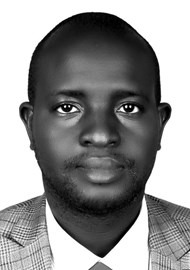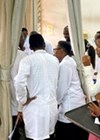Nigeria is the most populous nation on the continent of Africa. Within the country, there are 33,303 general hospitals and 59 tertiary hospitals to serve a population of approximately 210 million people [1]. Specialty-based practice of urology is domiciled in tertiary health facilities.
The local training of these specialists commenced some decades ago and at present, there are about 270 urologists registered with the national urological association of the country. A national report has earlier highlighted the low ratio of surgeons to patients in Nigeria (1.4 per 100,000 population) which is almost 20 times lower than the recommended level globally [2]. The turn of time has also heralded the introduction and continuous refinement of diagnostic and minimally invasive urological technologies as well as the expansion of urological practice into sub-specialties. However, there remains a wide disparity between the practice of urology in Nigeria compared to a country such as the United Kingdom. Furthermore, there is a changing paradigm of increased patient preference to directly seek specialist care in Nigeria which has resulted in increased presentation and workload at urology centres.
“The working week typically includes operating theatre sessions for a wide mix of urological emergencies and elective cases, diagnostic work such as transrectal ultrasound-guided prostate biopsies and uroflowmetry, specialist ward rounds and meetings for inpatient care, and multispecialty outpatient clinics”
In this article, I would like to describe the training pathway and practice environment of urologists in Nigeria, the clinical and social context of presentations of various urological conditions, and the threats and potential opportunities for the ongoing efforts at achievement of health and education-related sustainable development goals (SDGs).
Demographics of Nigeria and its healthcare system
The major providers of urological care in Nigeria are public tertiary and specialist health institutions. These are funded through budgetary allocations to health by the federal government and states of the federation. Available figures show that government funding for health represents 3.9% of the gross domestic product in Nigeria [3]. This is around a third of the current figure of 10.43% of GDP spent on public healthcare in the UK [4]. Similar to the NHS, there is a federal government-managed National Health Insurance Scheme (NHIS). While geographical coverage is about 90%, overall population coverage is only 5%; this is due to a number of reasons, which include poverty, low level of awareness, superstitious beliefs, and the lack of interest in the NHIS which is by law voluntary [5]. The burden of healthcare therefore largely remains at the individual and interpersonal level with patients, relatives or community donors responsible for out-of-pocket payments. Community donors are mostly local philanthropists and religious charities who operate on an ad-hoc basis. Support from larger and more organised charities is limited. Cost of healthcare compounds the problems of geographical access to modern urology in Nigeria. These limitations in affordability and inherent poor health-seeking behaviour of patients affect their subsequent choice of urological facilities as well as their adherence to treatment recommendations.
Clinical profile of patients with urological conditions in Nigeria
Patients present to urologists with a wide variety of clinical conditions in Nigeria. Lower urinary tract symptoms due to benign prostatic enlargement (LUTS / BPE) and urethral stricture are probably the most common presentations. A large number of men with prostate cancer present at an advanced stage, while it appears that other cancers like bladder cancer are increasing in incidence. There is a high caseload of erectile dysfunction and male infertility for which the commonly available care is limited to the first line of treatment. Paediatric urology presentations of undescended testis, posterior urethral valve, disorder of sexual differentiation and hypospadias are common, as is urinary incontinence. Emergency urology covers the full range of conditions which is perhaps no different from elsewhere, commonly priapism, testicular torsion, trauma, urinary tract stone, urinary retention, urosepsis and obstructive nephropathy.
Residency training
Structure of programme
The pathway for qualifying as a consultant urologist in Nigeria commences with residency training after MBBS graduation. All aspiring fellows are required to take a primary examination in the faculty of surgery of either the West African College of Surgeons (WACS) or the National Postgraduate Medical College of Nigeria (NPMCN). Candidates with a pass in this examination can then apply to accredited training centres for residency posts. The residency training is divided into two stages. The first phase, the membership stage, is a 36-month training in general surgery, urology and other surgical specialties followed by a membership or part 1 examination. Only candidates that pass this examination can proceed to the fellowship stage which comprises a further 36 months of training in different subspecialties of urology and the completion of a dissertation project. Attendance at training courses in basic surgical skills, management and manuscript writing as well as revision courses is mandatory. The fellowship exam, which is conducted twice a year, marks the end of the urology residency training in Nigeria. It comprises a dissertation defence, a theory exam with multiple choice and essay type questions, and a clinical exam consisting of a long case, several short cases and two parts of oral examination.
Work life
The average work duration of early career doctors in Nigeria is 68 hours every week. This is a much longer week compared to the 45-50 hours in the UK and surgeons are consequently at significant risk of burn-out in Nigeria. A way to address this is through the provision of support to increase manpower in this sector.
Urological practice in Nigeria
Services
The working week typically includes operating theatre sessions for a wide mix of urological emergencies and elective cases, diagnostic work such as transrectal ultrasound-guided prostate biopsies and uroflowmetry, specialist ward rounds and meetings for inpatient care, and multispecialty outpatient clinics. Teaching for trainees is provided on the job in all these locations, while moderated journal presentations and academic seminars are carried out in the seminar room.
There are however severe constraints because of the limited manpower which impedes delivery of care. For example, there are no full fellowship-trained andrologists, or laparoscopic urological surgeons practising in the entire country. These gaps could be sustainably filled through the Medical Training Initiative programme and the establishment of twinning partnerships with hospitals in the UK. Structured multidisciplinary team (MDT) management of diseases is at an infancy stage and could benefit from implementation projects to build its capacity.
Patient intra-hospital navigation
Urological referrals may be received from non-specialist units, family physicians and other hospital specialties, and are seen at outpatient clinics or as in-patient consults. The time from diagnosis to inpatient surgery varies with the centre but this could be up to three months in some centres, usually much shorter for day-case surgery. Seamless patient navigation however remains a problem with the entire spectrum of the clinical management of our patients being reliant on paper-based records.
Infrastructure and accessories
Infrastructures such as the urodynamic machine, endoscopic equipment for upper tract surgery and accessories to facilitate laparoscopic surgeries are not available in most public hospitals. In addition, the supply of implants such as the penile prosthesis and artificial urethral sphincter are usually sourced through direct physician-monitored importation rather than through local access from suppliers. This makes it difficult to offer the highest standard of care in these areas and improve the quality of life of the patients. Restricted floor space for sub-specialty-based ward and theatre sessions is another impediment to sub-specialisation and a factor in the rising waiting list for urological surgeries in public hospitals in the country. Indeed, expansion of the theatre, the acquisition of new technologies and upgrade of older facilities is limited by resource availability. Inspired by the present activities of KidsOR, an organisation that works to improve access to surgical care in low middle-income countries through the provision of theatre space and specialist equipment, one idea is to create an organisation that promotes the interest of global urology to drive the provision of infrastructure that will increase access to urological surgeries in low resource settings [6].
Research programme
Research activities in clinical urology are common in Nigeria but data retrieval is difficult because of the paper-based system of records. Patient care and the translation of guidelines and interventions into practice would greatly benefit from collaborative international trials.
Capacity development for urologists in Nigeria
The annual earning of a doctor at the registrar level in Nigeria is N3,240,000 (£5719.10) while that of a senior registrar is N4,800,000 (£8472.73). A day-one consultant earns about N7,800,000 (£13,768.19) per year [7]. This take-home pay is around four times lower than that of colleagues at the same level in the United Kingdom [8]. As such, being able to afford a Master’s degree programme in the UK (about £14-18,000) is a Herculean task for income earners in Nigeria. There is also a need to develop capacity for academic and clinical PhDs in urology to enhance research quality. Access to either simulation training or hands-on training for urological sub-specialisation in a well-developed centre is also limited due to its associated cost. There is, therefore, an urgent need for subspecialist training facilities and fellowships to support development of areas of clinical and academic need which are presently not available in Nigerian universities.
Conclusion
Lower middle-income economies like my country face multiple challenges which encompass funding and infrastructure. Specific to urology, there is an urgent need to develop expertise in subspecialties with support structures and technologies. These problems may be surmounted so that sustainable development can be achieved by leveraging the spirit of collaborative partnership in the commonwealth.
References
1. Welcome MO. The Nigerian health care system: Need for integrating adequate medical intelligence and surveillance systems. J Pharm Bioallied Sci 2011;3(4):470‑8.
2. Amedu JO, Ameh EA, Anyanwu SNC, et al. National Surgical, Obstetrics, Anaesthesia & Nursing Plan (NSOANP) for Nigeria. Federal Ministry of Health; 2019 https://health.gov.ng/doc/NSOANP.pdf [accessed 20 January 2022].
3. Varrella S. Health in Nigeria - statistics & facts. Statista 2021
www.statista.com/topics/
6575/health-in-nigeria/
[accessed 20 January 2022].
4. Yang J. Public health spending as a share of GDP in the UK 2000-2020. Statista 2021
www.statista.com/statistics/
472984/public-health-spending-share-of
-gdp-united-kingdom-uk/
[accessed 20 January 2022].
5. Alawode GO, Adewole DA. Assessment of the design and implementation challenges of the National Health Insurance Scheme in Nigeria: a qualitative study among sub-national level actors, healthcare and insurance providers. BMC Public Health 2021;21(1):1-12.
6. Kids OR: surgey for children. 2021
www.kidsor.org/
[accessed 20 January 2022].
7. Muanya C. Nigerian medical doctors among least paid globally. The Guardian 2020
https://guardian.ng/news/
nigerian-medical-doctors-
among-least-paid-globally/
[accessed 20 January 2022].
8. British Medical Association. Pay scales for junior doctors in England. 2021.
www.bma.org.uk/pay-and-contracts/
pay/junior-doctors-pay-scales/
pay-scales-for-junior-doctors-in-england?
__cf_chl_captcha_tk__
=pmd_Flv7o6zGpJCcm6t1aQAYKN1C5Ig
Lxitel1oOFwhuIdc-1635189191-0-gq
NtZGzNA2WjcnBszQZ9
[accessed 20 January 2022].








